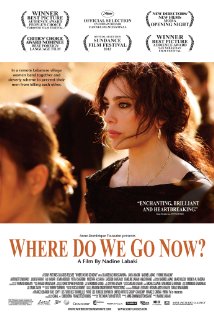
Directed and written by Lebanese actress Nadine Labaki, the movie focuses on the effort of women to keep sectarian violence from breaking out in their town. The town is isolated by a destroyed bridge that will only let a moped in and out. The women strive to keep the hot headed men from killing one another after religious tensions from outside flare and there are several incidents where a mosque and Christian religious icons are profaned. They try deceit; they try (improbably) hiring exotic dancers to distract the men and various other tricks. None of these seem to be particularly well conceived or effective. But this may be intentional. Getting the men under control seems like something of a fool’s errand.
It is probably best to think of this as allegory in any case.
It is also a good idea to keep in mind that Westerners may not be the intended audience. Americans especially like neat films with all the loose ends tied up. In this film there is no “bad guy” and you never find out who does any of the things that light the fuse of a potential powder keg. That isn’t the point. Although sometimes it can be a little difficult to discern what, precisely the point is. Again, this may well be intentional. The problems, the reasons behind the turmoil under the surface, are in the film and real life not easy to pin down.
One truth is easy to pin down; men are singled out as the root of the problem. It is hard to argue against this, be it in the real world or in the film. Women, with a few exceptions, are not the one’s starting wars or even localized sectarian violence.
Interestingly the film begins and ends in a graveyard, one side Christian and one side Muslim. Apparently men in the village have killed one another before and even though they seem to coexist more or less peacefully. There is no real attempt at showing real closeness between the men—more tolerance. The women are another matter, they are friends; they joke and laugh together in a more intimate manner than the men. This isn’t to say the men initially seem hostile but just not close.
The film breaks out into song now and again (one funny song and one about love) in a way that will make the average American filmgoer roll their eyes. But this sort of scene is common in films from various places around the world; from Egypt to India. It seems odd to Americans in a film like this these days. But it wasn’t so long ago dramas and comedies alike had musical “numbers” in them.
This is not a great film but it is a good one.
When a film comes out of the Middle East and is directed by a woman there is a justifiable tendency to give more praise than is merited. In this case praise is merited—with caveats. The film meanders and frustrates. There are a lot of characters and they are hard to keep track of and hard to feel much for specifically. You can care as you would for any human being but there is not a great deal of character development.
It lacks focus but it is still a likeable film especially in the discussion it raises. Unfortunately the people who need to see films like this most are not likely to be in the audience. Nor would it get through to them if they were. And that is a shame.


 RSS Feed
RSS Feed